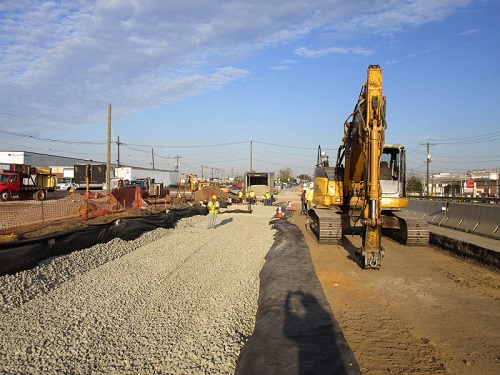The New Jersey Department of Transportation recently released a video detailing how its use of “foamed glass aggregate” provides a multitude of green benefits to the state – especially as the material is made from recycled glass bottles.
[Above photo by the New Jersey DOT]
Diane Gutierrez-Scaccetti, commissioner of the New Jersey DOT, noted in testimony before a state assembly hearing on her agency’s fiscal year 2024 budget plan that foamed glass aggregate is one of the “new innovations” her department is using to build resiliency into the state’s transportation projects.
“[We] recently started using ultra-lightweight foamed glass aggregate made from 99 percent recycled glass bottles [as] it is up to 85 percent lighter than traditional aggregate, which makes it a good material for projects that require fill on soft soils, areas with underground utilities, and embankments,” she explained.
She pointed to a recent example of a project – the Route 7 Wittpenn Bridge project, which connects Jersey City and Kearney over the Hackensack River – that used 32,000 cubic yards of foamed glass aggregate, repurposing more than 27 million bottles.
“As the effects of climate change, sea level rise, and increasingly severe weather continue to impact New Jersey, resiliency projects will become even more important,” Gutierrez-Scaccetti said. “We cannot control Mother Nature, so we are doing more to build resiliency into our projects and to safeguard our infrastructure for the future–not just a few years into the future, but for decades to come. It is about supporting today’s critical transportation infrastructure needs while laying the foundation for the next generation of transportation advancements in New Jersey.”
Many state departments of transportation are experimenting with ways to use recycled materials in roadway and other pavement designs to help boost their resiliency and sustainability.
For example, the Illinois Department of Transportation began working with the Illinois Center for Transportation in December 2021 to develop more “sustainable pavement practices,” which includes ways to incorporate more recycled materials such as plastic into asphalt mixes.
Both are working on a joint project – dubbed “R27-196-HS: Rheology-Chemical Based Procedure to Evaluate Additives/Modifiers Used in Asphalt Binders for Performance Enhancements: Phase 2” – to investigate methods to “soften” asphalt binder to reduce pavement cracking.
As recycled materials are added to hot mix asphalt, the asphalt tends to harden and become brittle, potentially leading to premature cracking. As a result the project’s researchers began testing the use of different “modifiers” or softening additives to asphalt binders to improve long-term pavement performance, especially when recycled materials are used in the mix.
Meanwhile, the Pennsylvania Department of Transportation wrapped up a pilot project in 2021 that used pellets made from grocery bags, milk jugs, and other recyclable plastics in an asphalt reconstruction project.
Those pellets were added to the asphalt in two quarter-mile test sections of the project at the entrance to Ridley Creek State Park, about 15 miles west of Philadelphia.
The expected benefits from this project include diverting waste plastics from landfills, helping to establish a market for recycled plastics, and extending the useful life of asphalt pavements, PennDOT said.

